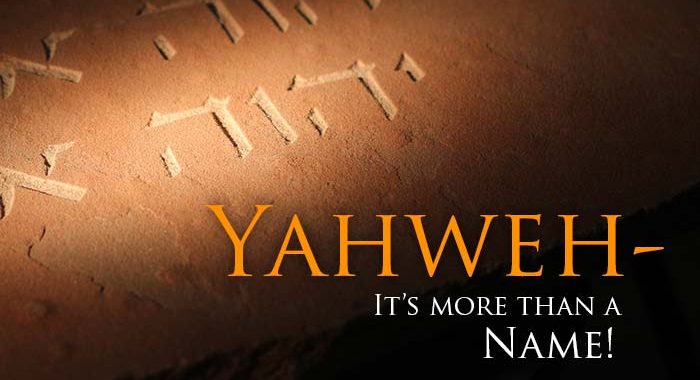
Throughout the Scriptures, God is given many names. The most common of these is YHVH (Yahweh), but when he spoke to Moses, he identified himself as Ehyeh asher Ehyeh—I AM WHO I AM.
“YHVH” is the Hebrew word that translates as “LORD”. Found more often in the Jewish scriptures than any other name for God (approximately 7,000 times), the title is also referred to as the “Tetragrammaton”, meaning the “The Four Letters”. YHVH comes from the Hebrew verb “to be” and is the special name that God revealed to Moses at the burning bush.“
God said to Moses, “I AM WHO I AM; This is what you are to say to the Israelites: ‘I AM has sent me to you.’ . . . This is my name forever, the name by which I am to be remembered from generation to generation.” (Exodus 3:14-15)
Therefore, YHVH declares God’s absolute being—the source of everything, without beginning and without end. For Israel, it meant even more than a philosophical ground of being. It meant that the Creator of the Universe was also their personal God. He saw their slavery in Egypt and was present to powerfully act on their behalf. He would destroy Pharaoh and his army and set His people free.
Although some pronounce YHVH as “Jehovah” or “Yahweh,” scholars really don’t know the proper pronunciation. The Jews stopped pronouncing this name by the 3rd century AD, out of fear of breaking the 3rd commandment of the Jewish Law:
“You shall not misuse the name of the LORD your God, for the LORD will not hold anyone guiltless who misuses his name” (Exodus 20:7).
Hundreds of years later, the religious leaders were looking for evidence and witnesses against Jesus, but couldn’t find any. After they arrested him, they went after Jesus himself and confronted him for his confession in Mark 14:61-65.
Again the high priest asked him, “Are you the Christ, the Son of the Blessed One?”
“I AM,” said Jesus. “And you will see the Son of Man sitting at the right hand of the Mighty One and coming on the clouds of heaven.”
The high priest tore his clothes. “Why do we need any more witnesses?” he asked. “You have heard the blasphemy. What do you think?”
They all condemned him as worthy of death. Then some began to spit at him; they blindfolded him, struck him with their fists, and said, “Prophesy!” And the guards took him and beat him.
 As we’ve seen throughout the ancient scriptures, “I AM” is the holy name for God to the Hebrews. When Jesus said, “I Am,” he was not only declaring himself the Christ—the Savior of the world—but he was claiming to be the eternal, self-existing, creator God.
As we’ve seen throughout the ancient scriptures, “I AM” is the holy name for God to the Hebrews. When Jesus said, “I Am,” he was not only declaring himself the Christ—the Savior of the world—but he was claiming to be the eternal, self-existing, creator God.
There’s no doubt about how the Sanhedrin interpreted Jesus’ claim. They condemned the Galilean carpenter’s son as a blasphemer and took him to Pilate to receive the death penalty.
You must make a decision about whether you agree with the 1st-century religious leaders and declare Jesus a blasphemer, or if you will worship Him as your Lord and your God.
Continue to research the original Hebrew texts to further understand God’s self-identification as “I AM WHO I AM”.
Check out the record for yourself. As you do, keep in mind the Jewish context of the Scriptures and the powerful meanings in some of the ancient words and symbols—you’ll be amazed at the layers of prophecy and truth!
Want More?
https://www.dontbeleftbehind.org
Sources: Randall Niles, www.AllAboutGOD.com, www.GotQuestions.org, and www.AllAboutTheJourney.org.










